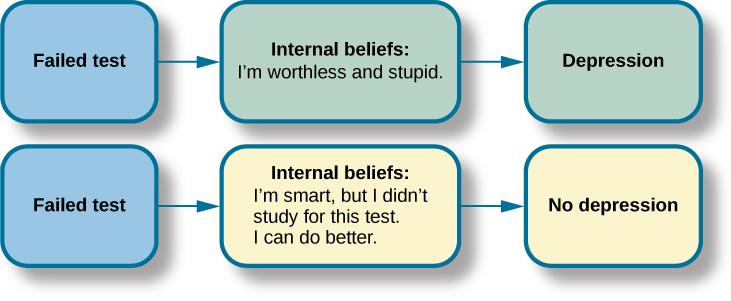Do you ever feel like your brain is playing a never-ending game of “Guess Who?” with your emotions and thoughts? Well, we’ve got news for you – there’s actually a scientific method behind the madness! Enter the world of Cognitive Behavioral Therapy (CBT), where your inner workings are dissected, analyzed, and put back together in a way that would make even Dr. Frankenstein proud. So grab your lab coat and get ready to unravel the mysteries of your mind – it’s time to dive into the science behind CBT!
Understanding Cognitive Behavioral Therapy
Cognitive Behavioral Therapy, or CBT for short, is like the therapy equivalent of a good ol’ fashioned brain workout. It’s all about taking those messy thoughts and feelings swirling around in your noggin and putting them through a mental obstacle course. Sounds fun, right?
One of the key principles of CBT is challenging your cognitive distortions. These sneaky little buggers are the irrational thoughts that like to pop up when you least expect them, like when you’re convinced everyone at the party is secretly judging you for wearing socks with sandals. But fear not, with CBT, you’ll learn to identify and dismantle these thoughts like a pro.
Another important aspect of CBT is learning how to change your behaviors in response to those pesky thoughts. It’s all about breaking the cycle of thought -> feeling -> behavior and replacing it with a new, healthier pattern. So, next time you catch yourself reaching for that pint of ice cream after a rough day, stop and ask yourself, “Is this really going to solve my problems or am I just feeding into my emotional eating habits?”
Overall, CBT is like giving your brain a much-needed renovation. It’s about reorganizing your thoughts, challenging your beliefs, and developing healthier coping strategies. So, get ready to flex those mental muscles and show those negative thoughts who’s boss!

Origins and Development of CBT
Cognitive Behavioral Therapy (CBT) is like the cool kid at school - it’s popular, effective and seems to have it all together. But how did this therapy approach come to be? Let’s take a trip down memory lane and explore the .
Back in the 1960s, a psychologist named Aaron Beck was practicing traditional psychoanalysis. He soon realized that his patients weren’t getting better by just talking about their feelings. So, he decided to shake things up and focus on the connection between their thoughts, feelings, and behaviors. And just like that, CBT was born!
As CBT gained popularity, other psychologists like Albert Ellis and John Kabat-Zinn jumped on the bandwagon. They added their own twist to the therapy approach, incorporating mindfulness and rational emotive behavior therapy (REBT) techniques. Suddenly, CBT became the therapy approach everyone was talking about – it was the Britney Spears of the therapy world.
Today, CBT has evolved into a versatile therapy approach that can be used to treat a variety of mental health issues, from anxiety to depression to PTSD. With its evidence-based practices and emphasis on changing maladaptive thoughts and behaviors, CBT continues to be a powerhouse in the world of therapy. So next time you’re feeling stuck in a negative thought spiral, remember – CBT is here to save the day!
Basic Principles of CBT
In the wild world of Cognitive Behavioral Therapy, there are a few basic principles that guide our noble quest to banish negative thoughts and behaviors. Let’s break it down with a dash of wit and wisdom:
Thoughts are Not Facts: Just because your brain tells you that you are a terrible salsa dancer doesn’t mean it’s true! CBT helps you challenge those pesky negative thoughts and replace them with more realistic ones. So next time your brain tries to convince you that you have two left feet, kindly remind it that you are the Fred Astaire of the salsa world.
Behavior Influences Thoughts: Ever notice how eating a whole pint of ice cream makes you feel like a lactose-achiever? That’s because our behavior can have a big impact on our thoughts and emotions. CBT helps you identify unhealthy behaviors and replace them with ones that will make you feel like the Beyoncé of self-care.
Change is Possible: It’s easy to fall into the trap of thinking that things will never get better, but CBT says otherwise! By challenging negative beliefs and practicing new coping skills, you can actually make positive changes in your life. So go ahead, give yourself a pat on the back for being one step closer to becoming the Zen master of your own mind.
Key Components of Cognitive Behavioral Therapy
Cognitive Behavioral Therapy (CBT) is like a delicious sandwich – made up of various key components that all work together to create a satisfying and effective treatment. Let’s break down the ingredients of this therapeutic sandwich:
First up, we have Cognitive Restructuring – the bread of our sandwich. This component involves identifying and challenging negative thought patterns that contribute to our distress. It’s like swapping out stale bread for fresh, whole grain goodness – giving our minds a healthier foundation to build upon.
Next, we have Behavioral Activation – the protein of our sandwich. This involves encouraging clients to engage in activities that bring them joy and fulfillment. Just like how protein fuels our bodies, engaging in positive behaviors can fuel our mental health and well-being. So, go ahead and add a generous portion of fun activities to your therapeutic sandwich!
And lastly, we can’t forget about Exposure Therapy - the spicy mustard that adds an extra kick to our sandwich. This component involves facing fears and anxieties in a controlled setting, helping clients build resilience and overcome their challenges. Just like how a little spice can enhance the flavor of a sandwich, exposure therapy can enhance the effectiveness of CBT by helping clients confront their fears head-on.

How CBT Works in Practice
So, you’ve heard about CBT and you’re wondering how it actually works in practice. Well, let me break it down for you in the most entertaining way possible.
Picture this: you’re sitting in a cozy office with a therapist who’s basically your own personal cheerleader, but with a degree. They start by asking you about your thoughts and feelings, and then the real fun begins. Here’s a sneak peek at how CBT works:
- Identifying Thought Patterns: You and your therapist team up to uncover the deep, dark secrets of your mind. Think Sherlock Holmes meets Oprah. You’ll quickly realize just how many of your thoughts are as dramatic as a reality TV show.
- Challenging Negative Beliefs: Time to put on your lawyer hat and cross-examine those pesky negative thoughts. Your therapist will help you find evidence to support or refute your beliefs, turning your mind into a courtroom drama (with less yelling).
- Changing Behavior: Say goodbye to old habits that no longer serve you. Your therapist will help you come up with new, healthier ways to cope with life’s challenges. It’s like a DIY project, but for your brain.
By the end of your CBT sessions, you’ll be armed with a whole new set of mental tools to tackle whatever life throws your way. Plus, you’ll have a therapist who knows you better than your best friend (but hopefully won’t spill your secrets). So, if you’re ready to dive headfirst into the quirky world of CBT, buckle up and get ready for the ride of your life.
Evidence-Based Results of CBT
CBT has been proven to be an effective treatment for a variety of mental health concerns, backed by solid evidence. Here are some of the key results that have been discovered through research:
- CBT has been shown to be just as effective as medication in treating depression and anxiety. So next time you’re stressed out, skip the side effects and opt for some good ol’ cognitive behavioral therapy!
- Research has found that CBT can significantly reduce symptoms of post-traumatic stress disorder (PTSD). No need to keep reliving that traumatic event over and over when you can reframe your thoughts and emotions instead!
- Studies have also shown that CBT is effective in treating insomnia. Say goodbye to counting sheep and hello to a good night’s sleep with the power of cognitive restructuring!
So, if you’re looking for a scientifically-backed approach to improving your mental health, CBT might just be the way to go. With results like these, who needs a magic pill when you’ve got the magic of cognitive behavioral therapy at your fingertips?
Applications and Efficacy of Cognitive Behavioral Therapy
Cognitive Behavioral Therapy (CBT) is a versatile form of therapy that can be applied to a wide range of mental health issues. Whether you’re dealing with anxiety, depression, or just the everyday stress of adulting, CBT has got your back. Here are some of the most common applications of CBT:
- **Anxiety Disorders**: CBT can help you identify and challenge those pesky anxious thoughts that keep you up at night. Say goodbye to overthinking every possible worst-case scenario!
- **Depression**: With CBT, you can learn to reframe negative thought patterns and develop healthier coping mechanisms. Who needs a pity party when you’ve got CBT on your side?
- **Phobias**: Whether you’re terrified of spiders or just really hate public speaking, CBT can help you face your fears head-on. Just think of it as exposure therapy with a fancy title.
But how exactly does CBT work its magic? Well, it’s all about changing the way you think and behave in response to different situations. By challenging unhelpful beliefs and replacing them with more rational thoughts, CBT helps you break free from self-destructive patterns and live your best life. So next time you catch yourself catastrophizing over a minor inconvenience, remember: CBT is here to save the day!
FAQs
What makes cognitive behavioral therapy different from other forms of therapy?
Cognitive behavioral therapy differs from other forms of therapy in that it focuses on changing negative thought patterns and behaviors to improve mental health. So basically, instead of just complaining about your problems, you actually have to do something about them. Revolutionary, right?
How effective is cognitive behavioral therapy for treating mental health issues?
Cognitive behavioral therapy has been shown to be highly effective for treating a variety of mental health issues, from anxiety to depression to phobias. It’s like the superhero of therapy – able to swoop in and save the day when you’re feeling overwhelmed and defeated.
How does cognitive behavioral therapy actually work?
Cognitive behavioral therapy works by helping you identify and challenge your negative thought patterns and replace them with more positive and realistic ones. It’s like having a little therapist sitting on your shoulder, whispering encouraging thoughts in your ear all day long.
Can anyone benefit from cognitive behavioral therapy?
Absolutely! Cognitive behavioral therapy can benefit anyone looking to improve their mental health and overall well-being. It’s like a mental workout – challenging but ultimately rewarding in the end.
Are there any downsides to cognitive behavioral therapy?
Well, it does require a lot of self-reflection and hard work, so it’s not exactly a walk in the park. But hey, no pain, no gain, right? Plus, the benefits far outweigh any temporary discomfort you may experience along the way.



